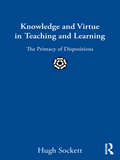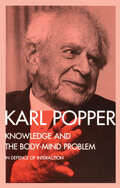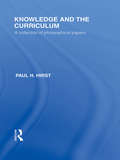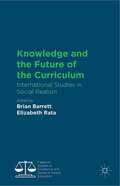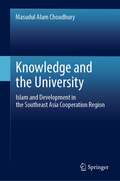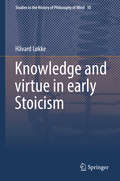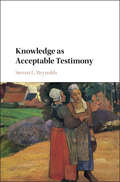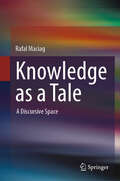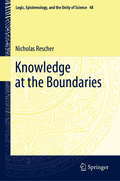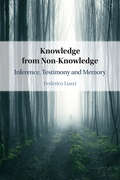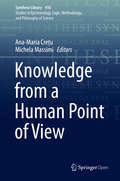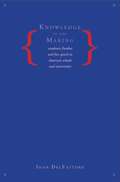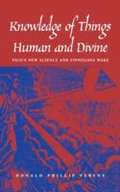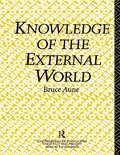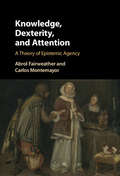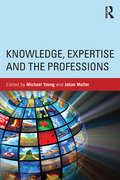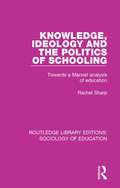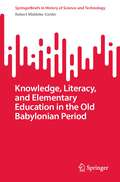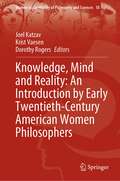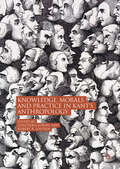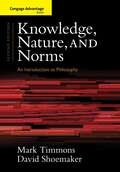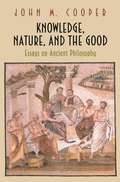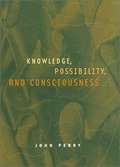- Table View
- List View
Knowledge and Virtue in Teaching and Learning: The Primacy of Dispositions
by Hugh SockettThe challenge this book addresses is to demonstrate how, in teaching content knowledge, the development of intellectual and moral dispositions as virtues is not merely a good idea, or peripheral to that content, but deeply embedded in the logic of searching for knowledge and truth. It offers a powerful example of how philosophy of education can be brought to bear on real problems of educational research and practice – pointing the reader to re-envision what it means to educate children (and how we might prepare teachers to take on such a role) by developing the person, instead of simply knowledge and skills. Connected intimately to the practice of teaching and teacher education, the book sets forth an alternative theory of education where the developing person is at the center of education set in a moral space and a political order. To this end, a framework of public and personal knowledge forms the content, to which personal dispositions are integral, not peripheral. The book’s pedagogy is invitational, welcoming its readers as companions in inquiry and thought about the moral aspects of what we teach as knowledge.
Knowledge and the Body-Mind Problem: In Defence of Interaction
by Karl PopperFirst published in 1995. Routledge is an imprint of Taylor & Francis, an informa company.
Knowledge and the Curriculum (International Library of the Philosophy of Education Volume 12): A Collection of Philosophical Papers
by Paul H. HirstThe papers in this volume provide a coherent philosophical study of a group of important and pressing educational issues such as the selection of objectives for less able children, the fundamental characteristics of teaching and the integration of the curriculum. A thesis on the necessary differentiation of knowledge into logically distinct forms is outlined, and is defended against recent philosophical criticisms. Its implications for curriculum planning are examined, with particular reference to the urgent problems of adeqately characterizing liberal education and those forms of moral and religious education that are appropriate in maintained schools.
Knowledge and the Future of the Curriculum
by Brian Barrett Elizabeth RataThis collection explores why powerful knowledge matters for social justice and discusses its implications for curriculum and pedagogy. The contributors argue that the purpose of education is to provide all students with access to powerful knowledge so that they acquire the means to move beyond their experiences and enhance their lives.
Knowledge and the Gettier Problem
by Stephen HetheringtonEdmund Gettier's 1963 verdict about what knowledge is not has become an item of philosophical orthodoxy, accepted by philosophers as a genuine epistemological result. It assures us that - contrary to what Plato and later philosophers have thought - knowledge is not merely a true belief well supported by epistemic justification. But that orthodoxy has generated the Gettier problem - epistemology's continuing struggle to understand how to accommodate Gettier's apparent result within an improved conception of knowledge. In this book, Stephen Hetherington argues that none of epistemology's standard attempts to solve that problem have succeeded: he shows how subtle yet fundamental mistakes - regarding explication, methodology, properties, modality, and fallibility - have permeated those responses to Gettier's challenge. His fresh and original book outlines a new way of solving the problem, and an improved grasp of Gettier's challenge and its significance is the result. In a sense, Plato can now embrace Gettier.
Knowledge and the University: Islam and Development in the Southeast Asia Cooperation Region
by Masudul Alam ChoudhuryThis book looks at a substantively new model of educational philosophy and its application within the field of tertiary education, in relation to socio-economic development in Southeast Asian members of the Organization of Islamic Conferences (OIC). Focusing on and drawing from the cross-regional South East Asian Cooperation (SEACO), a network promoting regional economic cooperation, the author presents a thoughtful evocation of a new orientation to educational philosophy and policy within the development context in the time of, and relating to, COVID-19. The generalized worldview of Islamic educational and socio-economic development model is laid down in relation to the philosophy of education and an ethical-scientific structure of development in terms of the theory of knowledge (epistemology, episteme). The foundation of scientific thought and a comparative Islamic worldview in understanding the unified reality of ‘everything’ is presented. The objectivity of socio-scientific learning at all levels of educational development is further explained within the context of SEACO and its think tank vis-à-vis a reconstructive perspective in which the Islamic episteme of the unity of knowledge and its substantive methodology is addressed and unpacked. The book is relevant to policymakers and scholarly researchers in Islamic philosophy and development and higher education in Southeast Asia and in the Muslim world and more broadly for the world of learning.
Knowledge and virtue in early Stoicism
by Håvard LøkkeThis book is about the epistemological views and arguments of the early Stoics. It discusses such questions as: How is knowledge possible, and what is it? How do we perceive things and acquire notions of them? Should we rely on arguments? How do we come to make so many mistakes? The author tries to give a comprehensive and conservative account of Stoic epistemology as a whole as it was developed by Chrysippus. He emphasizes how the epistemological views of the Stoics are interrelated among themselves and with views from Stoic physics and logic. There are a number of Stoic views and arguments that we will never know about. But there are passages on Stoic epistemology in Sextus Empiricus, Galen, Plutarch, Cicero, and a few others authors. The book is like a big jigsaw puzzle of these scattered pieces of evidence.
Knowledge and virtue in early Stoicism (Studies in the History of Philosophy of Mind #10)
by Håvard LøkkeThis book is about the epistemological views and arguments of the early Stoics. It discusses such questions as: How is knowledge possible, and what is it? How do we perceive things and acquire notions of them? Should we rely on arguments? How do we come to make so many mistakes?The author tries to give a comprehensive and conservative account of Stoic epistemology as a whole as it was developed by Chrysippus. He emphasizes how the epistemological views of the Stoics are interrelated among themselves and with views from Stoic physics and logic.There are a number of Stoic views and arguments that we will never know about. But there are passages on Stoic epistemology in Sextus Empiricus, Galen, Plutarch, Cicero, and a few others authors. The book is like a big jigsaw puzzle of these scattered pieces of evidence.
Knowledge as Acceptable Testimony
by Reynolds Steven L.Standard philosophical explanations of the concept of knowledge invoke a personal goal of having true beliefs, and explain the other requirements for knowledge as indicating the best way to achieve that goal. In this highly original book, Steven L. Reynolds argues instead that the concept of knowledge functions to express a naturally developing kind of social control, a complex social norm, and that the main purpose of our practice of saying and thinking that people 'know' is to improve our system for exchanging information, which is testimony. He makes illuminating comparisons of the knowledge norm of testimony with other complex social norms - such as those requiring proper clothing, respectful conversation, and the complementary virtues of tact and frankness - and shows how this account fits with our concept of knowledge as studied in recent analytic epistemology. His book will interest a range of readers in epistemology, psychology, and sociology.
Knowledge as a Tale: A Discursive Space
by Rafal MaciagThis text describes the process that led to knowledge becoming the most important modern good and a complex phenomenon beginning at the end of the 19th century. It was a change in the way of understanding the world proposed by mathematics and geometry. This volume reveals how the paradigm shift, still in progress, is gradually transforming less obvious fields of science, such as the humanities and social sciences while affecting the phenomenon of knowledge. Firstly, meta-analysis gained importance, and secondly, it became natural to perceive knowledge in a social context, showing its diverse and multi-cause dispersion, leading to the phenomenon of knowledge. Due to the interpretation of knowledge as a complex social phenomenon, the author proposes a new model of knowledge description, called the theory of discursive space, making it possible to describe the role and meaning of knowledge as a component of modern civilization that is all-encompassing. This text appeals to students and researchers working in the philosophy of technology.
Knowledge at the Boundaries (Logic, Epistemology, and the Unity of Science #48)
by Nicholas RescherThe book offers a reflection on the nature, scope, and limits of knowledge that have been at the focus of the author's work over decades. The essays collected in this volume expound and extend these efforts in exploring the outer fringes of understanding: the outer boundaries of conceivability, the limits of cognition, and the ramifications of ineffability and paradox. They join in exploring the lay of the land at the boundaries of knowledge.The first chapters address basic facts regarding the conceptualization of knowledge. This is followed by a study on how to deal with problems relating to the affirmation and considerations of truth. The final chapters scrutinize the limits of demonstration and the inherent impossibility of realizing an ideal systematization of our knowledge of totalities. The book affords novel perspectives regarding the thought of a widely appreciated philosopher. It is an original work aimed for readers interested in the theory of knowledge and philosophy of cognition.
Knowledge from Non-Knowledge: Inference, Testimony and Memory
by Federico LuzziAccording to the received view in epistemology, inferential knowledge from non-knowledge is impossible - that is, in order for a subject to know the conclusion of their inference, they must know the essential premises from which that conclusion is drawn. In this book, Federico Luzzi critically examines this view, arguing that it is less plausible than intuition suggests and that it can be abandoned without substantial cost. In a discussion that ranges across inference, testimony and memory he analyses the full range of challenges to the view, connecting them to epistemological cases that support those challenges. He then proposes a defeater-based framework which allows the phenomenon of knowledge from non-knowledge across these three epistemic areas to be better understood. His book will be of interest to a wide range of readers in epistemology.
Knowledge from a Human Point of View (Synthese Library #416)
by Michela Massimi Ana-Maria CrețuThis open access book – as the title suggests – explores some of the historical roots and epistemological ramifications of perspectivism. Perspectivism has recently emerged in philosophy of science as an interesting new position in the debate between scientific realism and anti-realism. But there is a lot more to perspectivism than discussions in philosophy of science so far have suggested. Perspectivism is a much broader view that emphasizes how our knowledge (in particular our scientific knowledge of nature) is situated; it is always from a human vantage point (as opposed to some Nagelian "view from nowhere"). This edited collection brings together a diverse team of established and early career scholars across a variety of fields (from the history of philosophy to epistemology and philosophy of science). The resulting nine essays trace some of the seminal ideas of perspectivism back to Kant, Nietzsche, the American Pragmatists, and Putnam, while the second part of the book tackles issues concerning the relation between perspectivism, relativism, and standpoint theories, and the implications of perspectivism for epistemological debates about veritism, epistemic normativity and the foundations of human knowledge.
Knowledge in the Making: Academic Freedom and Free Speech in America's Schools and Universities
by Joan DelfattoreHow free are students and teachers to express unpopular ideas in public schools and universities? Not free enough, Joan DelFattore suggests. Wading without hesitation into some of the most contentious issues of our times, she investigates battles over a wide range of topics that have fractured school and university communities--homosexuality-themed children's books, research on race-based intelligence, the teaching of evolution, the regulation of hate speech, and more--and with her usual evenhanded approach offers insights supported by theory and by practical expertise. Two key questions arise: What ideas should schools and universities teach? And what rights do teachers and students have to disagree with those ideas? The answers are not the same for K-12 schools as they are for public universities. But far from drawing a bright line between them, DelFattore suggests that we must consider public education as a whole to determine how--and how successfully--it deals with conflicting views. When expert opinion clashes with popular belief, which should prevail? How much independence should K-12 teachers have? How do we foster the cutting-edge research that makes America a world leader in higher education? What are the free-speech rights of students? This uniquely accessible and balanced discussion deserves the full attention of everyone concerned with academic goals and agendas in our schools.
Knowledge of Things Human and Divine: Vico's New Science and Finnegans Wake
by Donald Phillip VereneThis book takes the reader through the career and works of Giambattista Vico (1668-1744) from a new viewpoint. Two major figures introduced Vico to the twentieth century -- Benedetto Croce and James Joyce. From the mid-twentieth century on there was a growing desire to free Vico from the philosophical idealism of Croce, who in the early part of the century had presented Vico as the Italian Hegel.
Knowledge of the External World (Problems of Philosophy)
by Bruce AuneMany philosophers believe that the traditional problem of our knowledge of the external world was dissolved by Wittgestein and others. They argue that it was not really a problem - just a linguistic `confusion' that did not actually require a solution. Bruce Aune argues that they are wrong. He casts doubt on the generally accepted reasons for putting the problem aside and proposes an entirely new approach. By considering the history of the problem from Descartes to Kant, Aune shows that analogous arguments create difficulties for the contemporary philosophical consensus. He makes it clear that the problem remains acute, particualarly for our understanding of scientific evidence. The solution he proposes draws upon contemporary philosophy of science and probability theory.
Knowledge, Dexterity, and Attention
by Carlos Montemayor Abrol FairweatherContemporary cognitive science clearly tells us that attention is modulated for speech and action. While these forms of goal-directed attention are very well researched in psychology, they have not been sufficiently studied by epistemologists. In this book, Abrol Fairweather and Carlos Montemayor develop and defend a theory of epistemic achievements that requires the manifestation of cognitive agency. They examine empirical work on the psychology of attention and assertion, and use it to ground a normative theory of epistemic achievements and virtues. The resulting study is the first sustained naturalized virtue epistemology, and will be of interest to readers in epistemology, cognitive science, and beyond.
Knowledge, Expertise and the Professions
by Michael Young Johan MullerIt has long been recognised that specialised knowledge is at the core of what distinguishes professions from other occupations. The privileged status of professions in most countries, however, together with their claims to autonomy and access to specialised knowledge, is being increasingly challenged both by market pressures and by new instruments of accountability and regulation. Established and emerging professions are increasingly seen as either the solution, or as sources of conservatism and resistance to change in western economies, and recent developments in professional education draw on a competence model which emphasises what newly qualified members of a profession ‘can do’ rather than what ‘they know’. This book applies the disciplines of the sociology of knowledge and epistemology to the question of professional knowledge. What is this knowledge? It goes beyond traditional debates between ‘knowing how’ and ’knowing that’, and ‘theory’ and ‘practice’. The chapters cover a wide range of issues, from discussions of the threats to the knowledge base of established professions including engineers and architects, to the fraught situations faced by occupations whose fragile knowledge base and professional status is increasingly challenged by new forms of control. While recognising that graduates seeking employment as members of a profession need to show their capabilities, the book argues for reversing the trend that blurs or collapses the skill/knowledge distinction. If professions are to have a future then specialised knowledge is going to be more important than ever before. Knowledge, Expertise and the Professions will be key reading for students, researchers and academics in the fields of professional expertise, further education, higher education, the sociology of education, and the sociology of the professions.
Knowledge, Ideology and the Politics of Schooling: Towards a Marxist analysis of education (Routledge Library Editions: Sociology of Education #50)
by Rachel SharpFirst published in 1980, this book argues that a theory of ideology is essential to a theory of education. It relates developments in the Marxist theory of ideology to the analysis of schooling in a capitalist society. Beginning with an appraisal of the early twentieth century liberal social theorists, including Weber, Durkheim, Veblen and Mannheim, it demonstrates that the weakness of their approaches arose from a failure to comprehend adequately the nature of capitalism. It then outlines the state of the theory of ideology at the time and applies the concept in an analysis of contemporary schooling, concluding with a discussion of its political implications. The application of the theory of ideology offers important possibilities for a radical socialist strategy on education.
Knowledge, Literacy, and Elementary Education in the Old Babylonian Period (SpringerBriefs in History of Science and Technology)
by Robert Middeke-ConlinThis book examines education as a means to explore knowledge and literacy in the Old Babylonian period. It further employs a new method to research these topics. Contrary to numerous existing studies on the subject, the author examines elementary education globally, that is, in pursuit of Old Babylonian education in its entirety. Typically, education is examined in a piecemeal fashion. It's as if education centered on lexicography alone or mathematics alone. This work encompasses a view about educational content and knowledge systems, as opposed to only specific aspects or branches of them. In doing so, a characterization of institution and society is made possible allowing the work to open new general perspectives on Mesopotamian knowledge, literacy, and education.
Knowledge, Mind and Reality: An Introduction by Early Twentieth-Century American Women Philosophers (Women in the History of Philosophy and Sciences #18)
by Joel Katzav Krist Vaesen Dorothy RogersThis book is the first volume featuring the work of American women philosophers in the first half of the twentieth century. It provides selected papers authored by Mary Whiton Calkins, Grace Andrus de Laguna, Grace Neal Dolson, Marjorie Glicksman Grene, Marjorie Silliman Harris, Thelma Zemo Lavine, Marie Collins Swabey, Ellen Bliss Talbot, Dorothy Walsh and Margaret Floy Washburn. The book also provides the historical and philosophical background to their work. The papers focus on the nature of philosophy, knowledge, the philosophy of science, the mind-matter nexus, the nature of time, and the question of freedom and the individual. The material is suitable for scholars, researchers and advanced philosophy students interested in (history of) philosophy; theories of knowledge; philosophy of science; mind, and reality.
Knowledge, Morals and Practice in Kant’s Anthropology
by Robert B. Louden Gualtiero LoriniThis volume sheds new light on Immanuel Kant’s conception of anthropology. Neither a careful and widespread search of the sources nor a merely theoretical speculation about Kant’s critical path can fully reveal the necessarily wider horizon of his anthropology. This only comes to light by overcoming all traditional schemes within Kantian studies, and consequently reconsidering the traditional divisions within Kant’s thought. The goal of this book is to highlight an alternative, yet complementary path followed by Kantian anthropology with regard to transcendental philosophy. The present volume intends to develop this path in order to demonstrate how irreducible it is in what concerns some crucial claims of Kant’s philosophy, such as the critical defense of the unity of reason, the search for a new method in metaphysics and the moral outcome of Kant’s thought.
Knowledge, Nature, And Norms
by David Shoemaker Mark TimmonsFind everything you need for a solid introduction to philosophy with this brief, powerful text. One of the most concise introductory philosophy anthologies available, KNOWLEDGE, NATURE, AND NORMS: AN INTRODUCTION TO PHILOSOPHY, Second Edition features classical philosophy readings, short fiction, and literature from popular writers, as well as a wealth of effective learning tools. Concise, well-edited selections are designed to give first-time philosophy students what you need to succeed--a well-crafted focus on the essential elements of philosophical debate. Integrated learning tools, such as a comprehensive introductory essay at the beginning of the text, provides an overview of how to approach philosophy. Engaging Chapter Introductions highlight key arguments, while Reading Comprehension and Review Questions draw your attention to key ideas. A robust companion website further enhances learning with self-assessment exercises, study guides, and links to philosophical and other helpful resources. With this anthology, you'll find a complete range of philosophical topics, including key issues in epistemology, metaphysics, and ethics. This thorough introduction is all within a book that's one-third the length of a typical anthology for cost savings and unmatched clarity.
Knowledge, Nature, and the Good: Essays on Ancient Philosophy
by John M. CooperKnowledge, Nature, and the Good brings together some of John Cooper's most important works on ancient philosophy. In thirteen chapters that represent an ideal companion to the author's influential Reason and Emotion, Cooper addresses a wide range of topics and periods--from Hippocratic medical theory and Plato's epistemology and moral philosophy, to Aristotle's physics and metaphysics, academic scepticism, and the cosmology, moral psychology, and ethical theory of the ancient Stoics. Almost half of the pieces appear here for the first time or are presented in newly expanded, extensively revised versions. Many stand at the cutting edge of research into ancient ethics and moral psychology. Other chapters, dating from as far back as 1970, are classics of philosophical scholarship on antiquity that continue to play a prominent role in current teaching and scholarship in the field. All of the chapters are distinctive for the way that, whatever the particular topic being pursued, they attempt to understand the ancient philosophers' views in philosophical terms drawn from the ancient philosophical tradition itself (rather than from contemporary philosophy). Through engaging creatively and philosophically with the ancient texts, these essays aim to make ancient philosophical perspectives freshly available to contemporary philosophers and philosophy students, in all their fascinating inventiveness, originality, and deep philosophical merit. This book will be treasured by philosophers, classicists, students of philosophy and classics, those in other disciplines with an interest in ancient philosophy, and anyone who seeks to understand philosophy in philosophical terms.
Knowledge, Possibility, and Consciousness
by John PerryThis book is based on the Nicod lectures given in Lyon and Paris in June 1999. In this book the author takes on each of three major arguments against physicalism, showing that they pose no threat to antecedent physicalism. These arguments are the zombie argument, the knowledge argument, and the modal argument.
